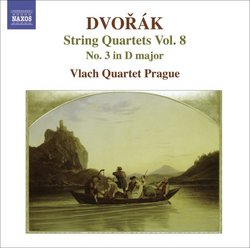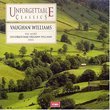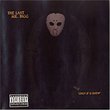| All Artists: Vlach Quartet Prague Title: Antonin Dvorak: String Quartet No. 3 Members Wishing: 0 Total Copies: 0 Label: Naxos Release Date: 5/26/2009 Genre: Classical Styles: Chamber Music, Historical Periods, Classical (c.1770-1830) Number of Discs: 1 SwapaCD Credits: 1 UPC: 730099437820 |
Search - Vlach Quartet Prague :: Antonin Dvorak: String Quartet No. 3
CD DetailsSimilar CDs
|
CD ReviewsIt DOES go on! J Scott Morrison | Middlebury VT, USA | 06/21/2009 (4 out of 5 stars) "This is the eighth (and, I believe, last) in the series of Dvorák quartets recorded in the late 1990s by the Vlach Quartet Prague, the successor of the old and fondly remembered Vlach Quartet, this one headed by Jana Vlachová, the daughter of the Vlach Quartet's first violinist, Joseph Vlach. And this CD contains only one quartet, the super-long String Quartet No. 3 in D Major, B. 18, which lasts over an hour! Dvorák wrote it in 1869 or 1870 and it is likely it was never played in his lifetime. Indeed, he probably didn't push for it to be played, squirreling it away in a drawer. He most likely recognized, over time, that it was not a typically Dvorákian work. In it he is still influenced by Schumann and even Wagner -- there are some really knotty chromatic passages, particularly in the first movement and the finale, that are problematic -- and certainly one would not without foreknowledge guess it as being by Dvorák. Granted there are some memorable melodies, a hallmark of Dvorák's mature style, as in the lovely, if too-long Andantino movement. But overall this quartet falls victim to its own garrulousness. This is particularly so in the first movement which goes on (and on) for almost twenty-four minutes!
The two weakest movements are the first and last ones. The second movement, the Andantino, has some lovely moments; there is a repose that hints at some things to come later in Dvorák's oeuvre. The third movement, Allegro energico, quotes a cheerful patriotic Bohemian folksong, 'Hej, Slované', at length. One can imagine this may have been due to the burgeoning Czech independence movement of the time. One cannot argue with the playing of the Vlach Quartet Prague. It is not their fault that one feels the burden of the first movement's undue length or the tortured chromaticism of the finale; they make the best of it. And they really get into the second and third movements. Scott Morrison" |





